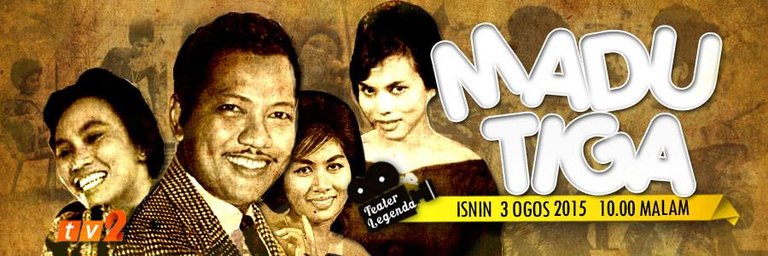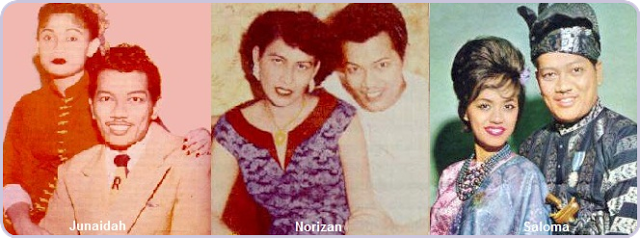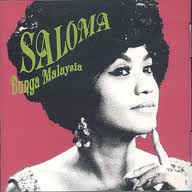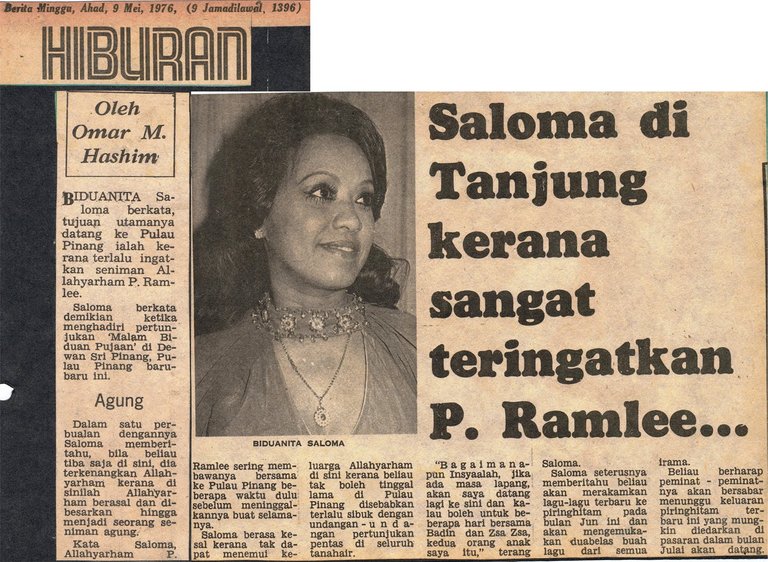I as a Penangnite have always been a big fan of the late P. Ramlee and recently I watched the movie Madu Tiga by P Ramlee on Youtube and realized that the Malays women in Madu Tiga were playing mahjong in the movie. I find out there are no movie reviews and full detailed biography of the legendary P.Ramlee in the internet. I shall write about the life story of P Ramlee after watching his life documentary
Brief Introduction of P.Ramlee
P. Ramlee, or Tengku Zakaria was born on 22 March 1929 to Tengku Nyak Puteh Bin Tengku Karim (1902 - 1955) and Che Mah Hussein (1904 - 1967). His father, Tengku Nyak Puteh, travelled from Lhokseumawe in Aceh, Indonesia) to settle in Penang; where his mother is from.
Ramlee received his education from the Sekolah Melayu Kampung Jawa (Kampung Jawa Malay School), Francis Light English School and then to Penang Free School; in all he was registered as “Ramlee” in school. Reportedly a reluctant student, Ramlee was nevertheless talented in music and football. His studies at the Penang Free School was interrupted by the Japanese occupation from 1942 to 1945, during which he enrolled in the Japanese navy school. He also learnt the basics of music and to sing Japanese songs during this period. When the war ended, he took music lessons that enabled him to read musical notations
His first screen appearance was in Chinta, a B. S. Rajhans-directed film produced by Malay Film Productions in 1948.[2] Between 1948 and 1955, he has starred in a total of 27 films. He eventually ventured into film directing under the mentoring of Madras-born director L. Krishnan.
Death
On 29 May 1973, P. Ramlee died at the age of 44 years old from a heart attack and was buried at Jalan Ampang Muslim Cemetery, in Kuala Lumpur.
A 90-minute documentary on his life released by History Channel Asia[3] on October 2010 further revealed that his untimely death becoming a shock to the nation and a sense of collective guilt following it began to spread nationwide. This was because, prior to his death, he had been discredited and rejected by the entertainment industry and the public at large who felt that he was a "has-been" and that his songs and films were no longer relevant or marketable. The documentary also revealed that, despite his previous success in the entertainment industry, P. Ramlee had died penniless, having given away the last of his money to a visitor to his house who he felt needed the money more than him.
This Steemit post is more about the movie Madu Tiga and the three wives of P-Ramlee.




Madu Tiga
Madu Tiga (Three Wives) is a 1964 black-and-white Malaysian romantic comedy film directed by and starring Malaysian artiste P. Ramlee.
In October 2014, The Straits Times ranked Madu Tiga as one of the top five Malay films made in Singapore, calling it a classic.
Jamil (P. Ramlee) has been married for twelve years with Latifah (Zaharah Agus). They have no children because Latifah is barren, and Jamil feels that she is neglecting him. He decides to marry another woman, Hasnah (Jah Hj. Mahadi), without Latifah's knowledge. Latifah's father, Haji Latiff (Ahmad Nisfu), secretly blesses the second marriage.
Latifah learns about the marriage through a friend, and confronts Jamil at the third night of the wedding celebrations. Hasnah and Latifah get into a fight, and Jamil flees in fear, not returning to either of his wives for three days and nights.
Jamil and his father-in-law come up with a plan to make amends with the two wives. For Latifah, Jamil fakes having a broken leg from an accident, and lies to her that he has divorced Hasnah. For Hasnah, Jamil fakes have injuries from getting into a fight with Latifah, and lies to her that he has divorced Latifah. Jamil is reconciled with both, though neither wife knows about the other.
Jamil returns to work. When collecting a debts owed by an old man Pak Ali, he meets Pak Ali's daughter, Rohani (Sarimah), and is enchanted. Jamil decides to pursue Rohani romantically, and asks her to marry him. The pair wed, and Jamil moves Rohani and her father into a luxurious house on the beach.
One day, Latifah and Hasnah meet by chance at a gold shop and get into an argument, during which it is revealed that both of them are still married to Jamil. Before the fight can escalate, Rohani stumbles by and stops them, advising them to find a way to settle their differences peacefully. Rohani volunteers to act as mediator, and asks them to come to her house for a discussion.
The day that Hasnah and Latifah visit Rohani's house, Jamil is also there and hides when he sees his first and second wife. Rohani calls Jamil out to join them, but he refuses to answer. It is then that Hasnah and Latifah notice a photograph of Jamil and Rohani, and the three wives realise that they share the husband. The three women agree not to turn on each other, but to target Jamil for fooling all of them. They chase Jamil frantically, and in the end he surrenders, admitting his mistakes and agreeing to divorce whoever wants to be divorced.
However the three women still love Jamil, and Rohani's thoughtfulness has made Latifah and Hasnah realise that peace is possible between them. All three women will remain married to Jamil, but he must be fair and loving to all three of them equally.
However, do you know about the three real life wives of P-Ramlee

P. Ramlee was married three times. His first wife was Junaidah, daughter of actor Daeng Haris. Married in the early 1950’s and divorced in 1954. In February 1955, he married the second time to Noorizan Mohd Noor in 1955 and they were divorced in 1961. P. Ramlee later took to the legendary singer Salmah Ismail a.k.a Saloma. They got married in November 1961. The marriage lasted till his death. He had seven children in total- three of whom were adopted and one a stepson born of Saloma.
Do You Know About Saloma?

Saloma
Saloma was born on 22 January 1934 in Pasir Panjang, Singapore as Salmah binti Ismail, the second daughter to Ismail Osman and Umi Kalsom Mahbon. During her childhood, Saloma enjoyed singing. She would usually share her thoughts of becoming a singer with her sister, Mariani. At the early age of five, Saloma was already singing with the local street bands. From there, her desire to become a singer grew even more.
Saloma's parents later divorced. Subsequently, Mariani and her followed their father to Tanjung Karang, Selangor in Tanah Melayu (now Malaysia). Both of them then lived with their father and stepmother. During the World War II, they used to help their father in the paddy fields. Unable to cope with the changed situation, both of them ran back to Singapore without their father. After that, Saloma and her sister Mariani lived with their mother and stepfather, a person named Mum Yusoff. Mum Yusoff was a musician with a local keroncong party called The Singapore Boys that was contracted to perform at a club called The New World Cabaret. As Saloma had always talked about being a singer, her stepfather brought her to the cabaret one night and introduced her to the audience. She was then asked to perform the song "Seven Lonely Days" by Georgia Gibbs. Her singing style and voice impressed the audience there. She continued with a number of other songs and this was the beginning of her career as a singer. She was then 13 years old.
Early career: 1949-1953[edit]
Saloma voice's began to play in the local radio when her stepfather brought her to see his orchestra perform on Radio Malaya. Singer Rokiah Hanafi, also known as Rokiah Wandah, was scheduled to sing several songs with the orchestra, but did not appear that day. Mum Yusoff decided to persuade Salomah to try singing the songs that were supposed to be sung by Rokiah. Fortunately, her performance was a success. After that, she received many offers from orchestras throughout Singapore to be their main singer. One of her songs that she sang at Radio Malaya was called "Sang Rang Bulan". The song was played in the film "Rachun Dunia" (Poison of This World) and was once recorded by a local singer named Rubiah.
In 1950, Saloma fell in love with the hero of a film called 'Aloha' after watching the film for the first time. The hero was played by P. Ramlee. At that time, Saloma was only 15 years and 11 months old. Her love for him grew stronger each day and Saloma swore that she would marry the actor one day. During the film blockbuster, P.Ramlee used to walk from his house to the studio. In the middle of the road, he had to walk pass Saloma's house in Mount Emily. Every time he walked towards the house, a Chinese boy selling grassjelly[clarification needed] would run to Saloma 's house to tell her about the presence of her beloved hero. Saloma would then tease P. Ramlee by calling out "Banjo" (the character he played in the film) and then hid when he turned around to see who had called out to him.
Saloma In Norma
Salmah (Saloma) during her early film career in the movie Norma.
During the early 1950s, her dream career to become a singer did not go the way she had wanted. Instead, she started her career as a film actress, offered by Nusantara Film. Her first film was entitled Pelangi (Rainbow), which received positive reviews among the audience. After that, she received a few offers from Nusantara Film to act in other films. In that period, she had acted in two other films, entitled 'Perkahwinan Rahsia' (Secret Wedding) and 'Norma'. In January 1952, she was offered a minor role as a club singer in a film called 'Chinta Murni' (True Love) by Nusantara Film, directed by Aman Ramlie or better known as A.R Tompel. At the time, it was her fourth film.
In April 1952, a few months after the release of Chinta Murni, Malay film fans were shocked by the news that announced her marriage with Aman Ramlie. At that time, Aman Ramlie was a well known director and comedian while she was only beginning to be recognised with the film 'Norma'. Their marriage lasted five months and they were divorced in September 1952 when Saloma was pregnant with their child.
According to her sister, Mariam, she was brought back to their house in Mount Emily to live with their mother. After her last film with Nusantara Film Company, titled Sesal Tak Sudah (Lasting Regret), Saloma immediately ended her contract with the company. The reason given was that she needed a rest because of her pregnancy and her refusal to work with her ex-husband any longer. At the end of 1952 until 1953, Saloma ended her career as a performer. In 1953, she gave birth to a son and only child, Armali Bin Aman Ramlie.
Restart: 1954-1960
After returning from her travel to Sarawak and Brunei on 23 July 1954, Saloma was offered by Pathe Company to record her voice. It was strongly supported by Syed Hamid, known as S.Hamid, who rose to fame at that time. They knew each other after acting in the film Sesal Tak Sudah. A song titled "Pandang Kasih" (Look of Love), composed by Rahmat Ali and lyrics by Ismadi, is a rumba-style while the song "Jika Tak Berjumpa" (If We Don't Meet) came from Arabic melodies which was then recomposed by S.Hussein Bagushir and lyrics by Wan Chu. Both of the songs were accompanied by Orkes Al Aishu Wal Meleh, conducted by S.Omar Bagushir. Saloma's first solo and also her first song recorded on vinyl by Pathe Company (numbered PTH 143) was "Pandang Kasih" while the song "Jika Tak Berjumpa" was her first duet with S.Hamid.
In 1955, Saloma was offered an acting role in a film by Studio Jalan Ampas which she accepted. Her first film with Studio Jalan Ampas was entitled Empat Isteri (Four Wives). This was last film directed by B.S. Rajhans. The film also starred Daeng Haris, Normadiah, Latifah Omar and Salmah's sister, Mariam (as Mariani). During the year, Salomah also recorded several songs including "Burong Punggok" (The Owl). In February 1956, she was offered to replace actress Siput Sarawak in the film Adekku (My Younger Sibling). There were rumours said that Siput Sarawak had quit after most of the movie scenes recorded.
After her success as a singer and also an actress, Shaw Brothers studio decided to give her a more commercial name. She got her stage name based on the film 'Salome' starring Rita Hayworth. In the same year, Saloma joined Panca Sitara, a band led by P. Ramlee.
International success: 1961-1968[edit]
Saloma began singing at the age of seven and was a professional singer by the time she was in her teenage years. Her singing was more in the style of Ella Fitzgerald and Doris Day. While she did become an actress later on, she always said she preferred singing to acting. As a singer, she sharpened her talents with Orkes Fajar Murni, led by Yusof Osman, during the early year of her career. She was also involved with another orchestra, Panca Sitara, in the 1960s.
Discography
Songs
Some of her more popular songs are as follows:
"Pandang Kasih"
"Bunga Tanjung"
"Inang Baru"
"Selamat Hari Raya" (1955)
"Jelingan Mata" (1958)
"Singapura Waktu Malam" (1962)
"Apa Guna Berjanji" (1965)

Hi! I am a robot. I just upvoted you! I found similar content that readers might be interested in:
https://en.wikipedia.org/wiki/Saloma_(actress)
I mistakenly write Madu Tiga as Tiga Madu in my Steemit Post in my title. How do i edit my Steemit post?
Hi @limeujin, you will see "EDIT" word next to the "Reply" word. You can edit within 7 days of your post..:)